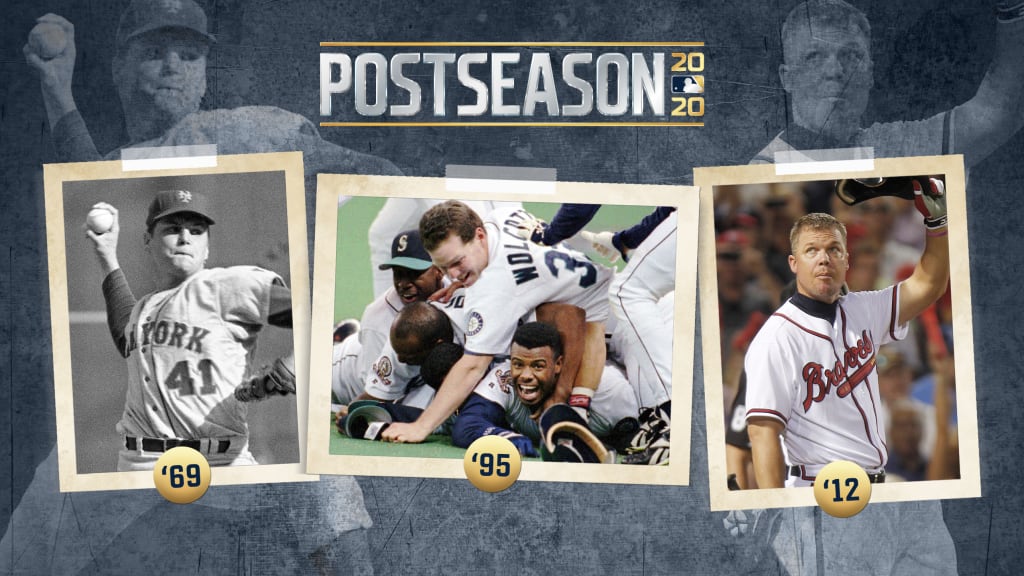
The first 65 World Series were pretty uncomplicated. You had a winner of the American League, you had a winner of the National League. The two met in a best-of-seven (well, actually, it was best-of-nine a few times -- we didn't say it was totally uncomplicated) set to determine a champion.
But little is static in the world of sports or the world at large. And as Major League Baseball has evolved in style and geographic scope over the last half-century, its postseason has morphed from the automatic Fall Classic to a trickier tournament, replete with upsets and upstarts.
While the 16-team format for 2020 is one-of-a-kind due to the unusual circumstances created by a global pandemic, it does serve as a reminder that previous October alterations have dialed up the drama.
Here's a look at the four other times the format was modified and what that wrought the year the change was made.
1969: Advent of the LCS
MLB's westward migration and 1960s expansion necessitated a new way of crowning a champion. The leagues were split into East and West Divisions, with the winners of those subsets meeting in a best-of-five League Championship Series (it became a best-of-seven in 1985).
The inaugural LCS round might seem straightforward, as the 109-win Orioles defeated the 97-win Twins, and the 100-win Mets eliminated the 93-win Braves. Those '69 Mets, though, were called "Amazin'" for a reason. The powerful Braves of Hank Aaron and Orlando Cepeda were regarded as the favorites, but the Mets somehow outslugged them to sweep the series and advance to face the O's in the World Series, where they completed an even bigger upset.
1981: The halves and have-nots
Suspended midway by a players' strike, the 1981 season was a mess. It was split into two halves, with the winners of each division in each half facing each other in a best-of-five Division Series round. The two teams with the highest winning percentages in the NL -- the Reds and Cardinals -- missed the playoffs on what amounted to a technicality.
Ah, but the baseball was pretty good. Three of the four Division Series went the distance, with the Yankees beating the Brewers, the Dodgers beating the Astros and the Expos beating the Phillies in the decisive fifth game (the A's swept the Royals).
But for all the chaos and uniqueness of the arrangement, the two teams with the regular season's best run differentials -- the Dodgers and Yankees -- were the ones that reached the Series, with L.A. prevailing in six games.
1995: Let's get Wild
Like so many other changes in baseball's history, the birth of the three-division format and the creation of the Wild Card spots pestered the purists.
But it was manna for fans of the Indians, who quickly found the AL Central to their liking after decades without distinguishment in the East. And the Rockies, who bashed their way a Wild Card spot in just their third season. And the Mariners, who captured the West, then took down the Yankees in the thrilling Game 5 finale of the ALDS -- a win that very well may have saved baseball in Seattle.
The division-winning Braves won it all, but in the years since, we've had seven Wild Card teams go on to win the World Series.
2012: Let's get Wilder
By this point, the complaints were not so much about the Wild Card's existence but about the absence of added hurdles for Wild Card clubs.
To address this -- and to create a must-see matchup for television -- MLB added a second Wild Card entry in each league and the one-and-done Wild Card Game. And right away, the format upended October. The 88-win Cardinals grabbed the newly created fifth seed in the NL and took down the Braves in Chipper Jones' final game with the help of a controversial infield fly call. And though they didn't win it all for the second straight year, they did manage to take down the 98-win Nationals in five games in the NLDS.
Seven years later, the Wild Card-winning Nats got their revenge on the Cards in the NLCS round, en route to becoming the second Wild Card Game participant (joining the 2014 Giants) to win the World Series.
